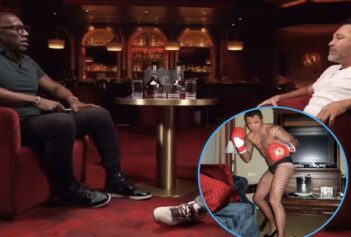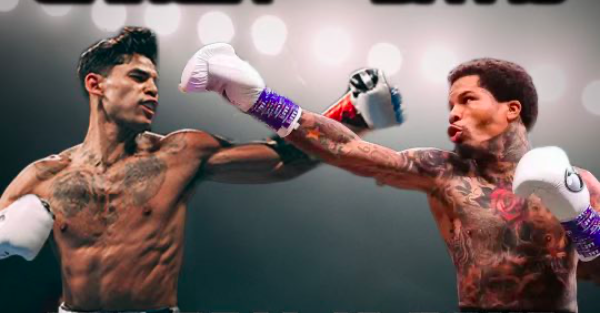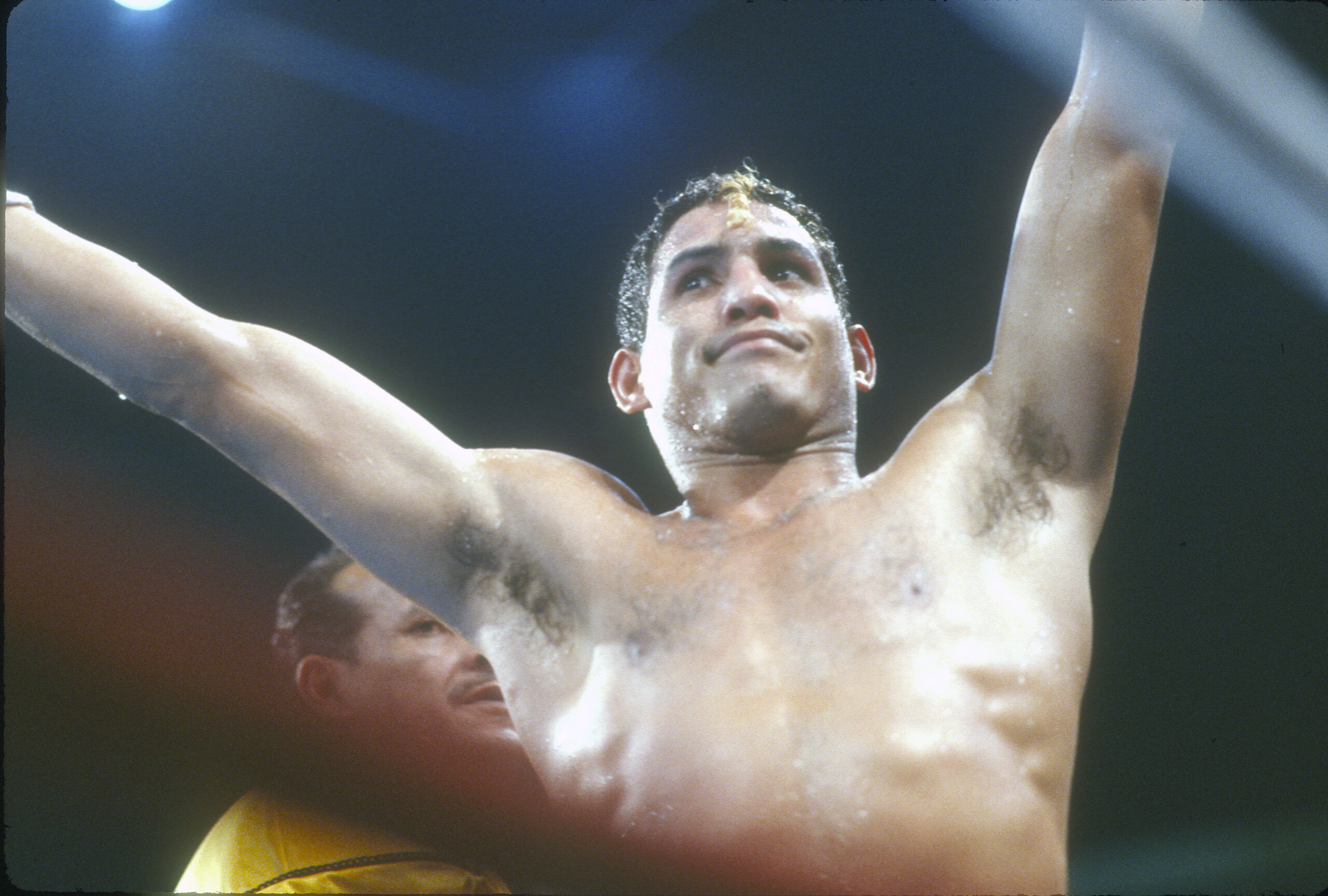After wins over some formidable opponents (Juan Luis Hernndez, Giovanni Delgado and Rene Alvarado) 23-year-old Joseph “Jo Jo” Diaz, a blue chip featherweight in Oscar De La Hoyas Golden Boy Promotions stable, will be fighting a 10-round featherweight main event against Hugo Partida at Fantasy Springs Resort Casino in Cali, for the vacant NABF featherweight title live on Boxeo Estelar on Estrella TV tonight at 10pm EST. Its a crucial step in the southpaws career as he attempts to secure his first title since turning pro three years ago.
The Shadow League spoke with the rising featherweight on Thursday.
The Boxing Kid
The story of undefeated boxer and former Olympian Jo Jo Diaz holds some striking similarities to the cult classic movie The Karate Kid. In the first segment of the legendary five-movie series Daniel LaRusso (Ralph Macchio) moves to Southern California, but quickly finds himself the target of a group of bullies who study karate at the Cobra Kai dojo. Under the tutelage of Mr. Miyagi, he learns martial arts and defeats the local bullies in a tournament.
Similarly, Diaz was a chubby, 9-year-old kid growing up in South El Monte, a city of about 21,000 folks in the San Gabriel Valley in LA. He was the target of extreme bullying as a shorty, but like The Karate Kid, Diaz learned the art of hand-to-hand combat which sparked a fearlessness and overall greatness within.
JO JO: The reason why I started boxing is because I was always a small and very nice kid and a lot of the kids in elementary school used to try and pick on me because I was so small and fragile. They would always try to take advantage of me. So one day I went to my father and told him that I just couldnt take it anymore and he said, Joseph theres only one thing we can really do… is take you to a local boxing gym where you can learn self defense and defend yourself.
Its a crazy story man, because when I went to the boxing gym, the same guy that used to pick on me and bully me was working out in the same gym. He was actually a boxer. So when I went in there and he saw me he said, Oh you want to be tough right? If you think youre tough then lets spar.
I didnt even know what sparring was, but my dad was there so I was trying to be brave. I told the kid, Alright. give me a week and I will spar you. He started laughing with his friends and said, Alright. Whatever
When my dad explained to me that sparring was actually fighting someone in the ring, I was scared. I looked like I had seen a ghost. I was shocked and didnt know what to do. I told my dad that I dont think I should go back to the gym anymore. My dad said, “No. Joseph. Dont worry. Im going to look up some YouTube videos and read some books and we are going to get ready for this guy.”
Almost a week passed and we were practicing technique and stuff and the first thing my dad taught me was how to throw a body shot and to attack the body right away. Once you attack the body their hands are going to drop and then you can attack on top.
So when the day came and I ended up sparring the guy, he had his shirt off and he was all muscled out. I had my shirt off and I was all fat and everything, but we ended up sparring and I attacked the body right away. I could see that he was hurt. So I started throwing punches on top and I made him cry and I made him bleed in the second round and they ended up stopping the fight. Ever since then I just fell in love with the sport because I knew I could defend myself against this bully and I knew I could do something with this sport. On that day it became my passion.
A passion that has taken the little fat kid that was bullied and transformed him into an Olympian, ring-wrecker with an 18-0 record (10 KOs) and a growing presence as one of the most marketable faces in boxing.
JO JO: Had my first amateur fight when I was 10 years old. I won my first junior nationals when I was 11. I wasnt even thinking about becoming an Olympian. When I was 16 years old I told my father and Ben Lira that once I turned 17 I wanted to turn pro because my family was struggling with bills and finances and I knew I was a pretty good fighter, having had about 70 or 80 bouts at the time and winning a few junior national tournaments. They agreed to it at first, but then seeing the talent that I had, they said, Joseph, the Olympics is two years away. You can probably become an Olympian. Youve won all the Junior Olympics and national tournaments, so lets see how you compete in the national tournaments at 17. If you win you have a great shot to become an Olympian, which is a great final step before becoming pro.”
I thought about it and felt that it would be an awesome experience to represent my country at the Olympic Games. So I ended up winning my first national tournament when I was 17 and won a few more tournaments. I was the 2011 U.S. National Champion at Featherweight at the U.S. Olympic Training Center in Colorado Springs, Colorado. I won the Olympic Trials and then had to go to another tournament and finish at least 8th to make the Olympics as a bantamweight, and I finished fifth. It was a dream come true.
Mexico Citys Hugo Olimpico Partida (20-6-2, 15 KOs) is no pushover pastry and Diaz knows that a loss here could damage his lofty future goals.
JO JO: This guy Partida I’m fighting for the NABF title is tough, but hes an obstacle I have to conquer. I believe our styles are kind of similar. We are both very aggressive and we love to counter on the inside. Hes from Mexico City so he has great elevation training so he will have great conditioning going into the fight and he will be very durable as well. I see on film that on the inside he likes to throw a lot of body shots right away. Me and my father came with a good game plan we are going to outsmart him and outbox him, land effective body shots and hopefully get him out of there.
The main thing is to make a statement and show everybody that I can be the next big thing in the 126 pound weight class. If I do win this title it’s going to rank me in the Top 10 in the WBC, WBO and IBF I think…so it’s a good opportunity for me and will open up a lot of doors and hopefully if I give a really great show, then 2016 could be my breakout year and I can fight guys in Top 10 and maybe by the end of next year fight for a world title
Fighting dangerous competition is part of a boxers rise to championship contender and Diaz says hes willing to fight the best competition to achieve his goals. Diaz completed a six-week camp with his father/coach Joseph Diaz and long time trainer Ben Lira in his hometown. Also in camp was strength & conditioning trainer Daryl Hudson.
JO JO: Thats the key. Fighting tough fighters right away. Oscar De La Hoya and Golden Boy Promotions and my manager have done a tremendous job matching me with guys who have great experiences and guys who are going to teach me stuff in there. I want to learn in there. I dont want to fight guys who have negative records and are just in there for a paycheck man.. I want to fight guys that are going to try to pull an upset and beat me and those are the guys that I’m going to learn from and theyve been matching me up with some tough opponents and fortunately I’ve been getting those Ws and great learning experiences.
Diaz could be getting ready for Rio de Janeiro and the 2016 Olympics and hed be a heavy favorite. In 2012, he became the first American boxer to qualify for the London Olympics by becoming a quarter-finalist at the 2011 World Amateur Boxing Championships, where he thumped both 2004 Olympic silver medalist Worapoj Petchkoom of Thailand and former world championship bronze medalist scar Valdez of Mexico. It was one rugged opponent after the other and eventually Diaz suffered a questionable loss to 2011 Cuban amateur champion Lzaro lvarez.
Even in defeat, Diazs impressive Olympic display convinced his camp that he had maxed out at the ameteur level and was ready to rock-n-roll with the warriors of prize fighting.
JO JO: After my Olympic experience I thought I had a great performance and a lot of people felt I won the fight, so it didnt bother me at all because I know God has a plan for everything and everything happens for a reason. We had to discuss whether or not I would fight in the 2016 Olympics or turn pro. Golden Boy and De La Hoya liked what they saw in the Olympics and offered me a contract. They got in contact with my manager and we finally got a deal done So at the end of the day the 2012 Olympics loss opened a lot of doors for me.
My main focus is to get some World Title shots. I know that if I get some title fights I’m going to be able to be good financially and make sure my family is stable and I can give money to my sisters and all the family that I have that are in need, I can help them out. But most importantly I want to be a role model for all the kids in my community and throughout the United States. I want to show them that dreams do come true and that anything can happen. I want to open up charities and foundations and have basketball events just to be close to my fans and be a good role model for the kids. I want a title shot at 126 and eventually move up to 130 and get a title there and then the highest is 135 and I want to win a title there.



